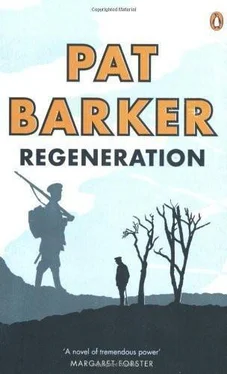Fothersgill, his long nose twitching fastidiously, had started to complain about the soup. ‘Nay, verily,’ he said. ‘A man knoweth not what manner of thing he eateth.’ He laughed as he said it, the laugh of a man who takes small discomforts very seriously indeed. Sassoon, marooned between two particularly bad stammerers, felt no need to take part in the conversation. Instead, he twisted round in his seat and looked for Owen, remembering the last poem he’d been shown. ‘ Out there, we’ve walked quite friendly up to Death;/Sat down and eaten with him, cool and bland —/Pardoned his spilling mess-tins in our band …’ Precisely, Sassoon thought. And now we complain about the soup. Or rather, they do.
After dinner he went straight to Owen’s room. ‘Do you mind?’ he said. ‘I’m on the run from Theosophy.’
Owen was already clearing papers from the chair. ‘No, come in.’
‘I can’t stay in the same room with him.’
‘You should ask Rivers for a change.’
‘Too late. He goes tomorrow. Anyway, I wouldn’t want to bother him. Have you got anything for me?’
‘This.’
Sassoon took the sheet and read the whole poem through twice, then returned to the first two lines.
What minute-bells for these who die so fast?
— Only the monstrous/solemn anger of our guns.
‘I thought “passing” bells,’ Owen said.
‘Hm. Though if you lose “minute” you realize how weak “fast” is. “Only the monstrous anger…”’
‘“Solemn’?”
‘“Only the solemn anger of our guns.” Owen, for God’s sake, this is War Office propaganda.’
‘No, it’s not.’
‘Read that line.’
Owen read. ‘Well, it certainly isn’t meant to be.’
‘I suppose what you’ve got to decide is who are “these”? The British dead? Because if they’re British , then our guns is…’
Owen shook his head. ‘All the dead.’
‘Let’s start there.’ Sassoon crossed out “our” and pencilled in “the”. ‘You’re sure that’s what you want? It isn’t a minor change.’
‘No, I know. ‘If it’s “the”, it’s got to be “monstrous”.’
‘Agreed.’ Sassoon crossed out ‘solemn’. ‘So:
What passing-bells for these who die… so
fast
?
— Only the monstrous anger of the guns.
‘Well, there’s nothing wrong with the second line.’
‘“In herds”?’
‘Better.’
They worked on the poem for half an hour. The wind had been rising all evening, and the thin curtain billowed in the draught. At one point Sassoon looked up and said, ‘What’s that noise?’
‘The wind.’ Owen was trying to find the precise word for the sound of shells, and the wind was a distraction he’d been trying to ignore.
‘No, that. ’
Owen listened. ‘I can’t hear anything.’
‘That tapping.’
Owen listened again. ‘No.’
‘Must be imagining things.’ Sassoon listened again, then said, ‘They don’t wail. They hiss.’
‘No, these are going right over.’
‘That’s right. They hiss.’ He looked at Owen. ‘I hear hissing.’
‘ You hear tapping.’
The wind went on rising all evening. By the time Sassoon left Owen’s room, it was wailing round the building, moaning down chimneys, snapping branches off trees with a crack like rifle fire. All over the decayed hydro, badly fitting windows rattled and thumped, and Sassoon, passing several of his ‘fellow breakdowns’ in the corridor, thought they looked even more ‘mental’ than usual.
His own room was empty. He got into bed and lay reading while he waited for Fothersgill to return from his bridge session. As soon as he entered the room, Sassoon rolled over and pretended to be asleep. A tuneless whistling ensued, punctuated by grunts as Fothersgill bent over his shaving mirror and tweezed hairs out of his nostrils.
At last the light was out. Sassoon lay on his back, listening to the roar of wind and rain. Again he heard tapping, a distinct, purposeful sound, quite unlike the random buffeting of the wind. On such a night it was impossible not to think of the battalion. He listened to the surge and rumble of the storm, and his mind filled with memories of his last few weeks in France. He saw his platoon again, and ran through their names — not a particularly difficult feat, since no fewer than eight of them had been called Jones. He recalled his horror at their physique. Many of them were almost incapable of lifting their equipment, let alone of carrying it mile after mile along shelled roads. He’d ended one march pushing two of them in front of him, while a third stumbled along behind, clinging to his belt. None of the three had been more than five feet tall. You put them alongside an officer — almost any officer — and they seemed to be almost a different order of being. And as for their training. One man had arrived in France not knowing how to load a rifle. He saw them now, his little band, sitting on bales of straw in a sun-chinked barn, while he knelt to inspect their raw and blistered feet, and wondered how many of them were still alive.
The windows banged and rattled, and again, in a brief lull, he thought he heard tapping. There were no trees close enough to touch the glass. He supposed there might be rats, but then whoever heard of rats tapping? He tossed and turned, thinking how stupid it was not to be able to sleep here, in safety and comfort, when in France he’d been able to sleep anywhere. If he could sleep on a firestep in drenching rain, surely he could sleep now…
He woke to find Orme standing immediately inside the door. He wasn’t surprised, he assumed Orme had come to rouse him for his watch. What did surprise him, a little, was that he seemed to be in bed. Orme was wearing that very pale coat of his. Once, in ‘C’ company mess, the CO had said, ‘Correct me if I’m wrong, Orme, but I have always assumed that the colour of the British Army uniform is khaki. Not… beige. ’ ‘Beige’ was said in such Lady Bracknellish tones that Sassoon had wanted to laugh. He wanted to laugh now, but his chest muscles didn’t seem to work. After a while he remembered that Orme was dead.
This clearly didn’t worry Orme, who continued to stand quietly by the door, but Sassoon began to think it ought to worry him. Perhaps if he turned his head it would be all right. He stared at the window’s pale square of light, and when he looked back Orme had gone.
Fothersgill was awake. ‘Did you see anybody come in?’ Sassoon asked.
‘No, nobody’s been in.’ He turned over and within a few minutes was snoring again.
Sassoon waited for the rhythm to be firmly established, then got out of bed and walked across to the window. The storm had blown itself out, though twigs, leaves and even one or two larger branches, scattered across the tennis courts, bore witness to its power. The palms of his hands were sweating and his mouth was dry.
He needed to talk to Rivers, though he’d have to be careful what he said, since Rivers was a thorough-going rationalist who wouldn’t take kindly to tales of the supernatural, and might even decide the symptoms of a war neurosis were manifesting themselves at last. Perhaps they were. Perhaps this was the kind of hallucination he’d had in the 4th London, but no, he didn’t believe that. His nocturnal visitors there had come trailing gore, pointing to amputations and head wounds, rather like the statues of medieval saints pointing to the instruments of their martyrdom. This had been so restrained. Dignified. And it hadn’t followed on from a nightmare either. He thought back, wanting to be sure, because he knew this was the first question Rivers would ask. No, no nightmare. Only that tapping at the window before he went to sleep.
Читать дальше












